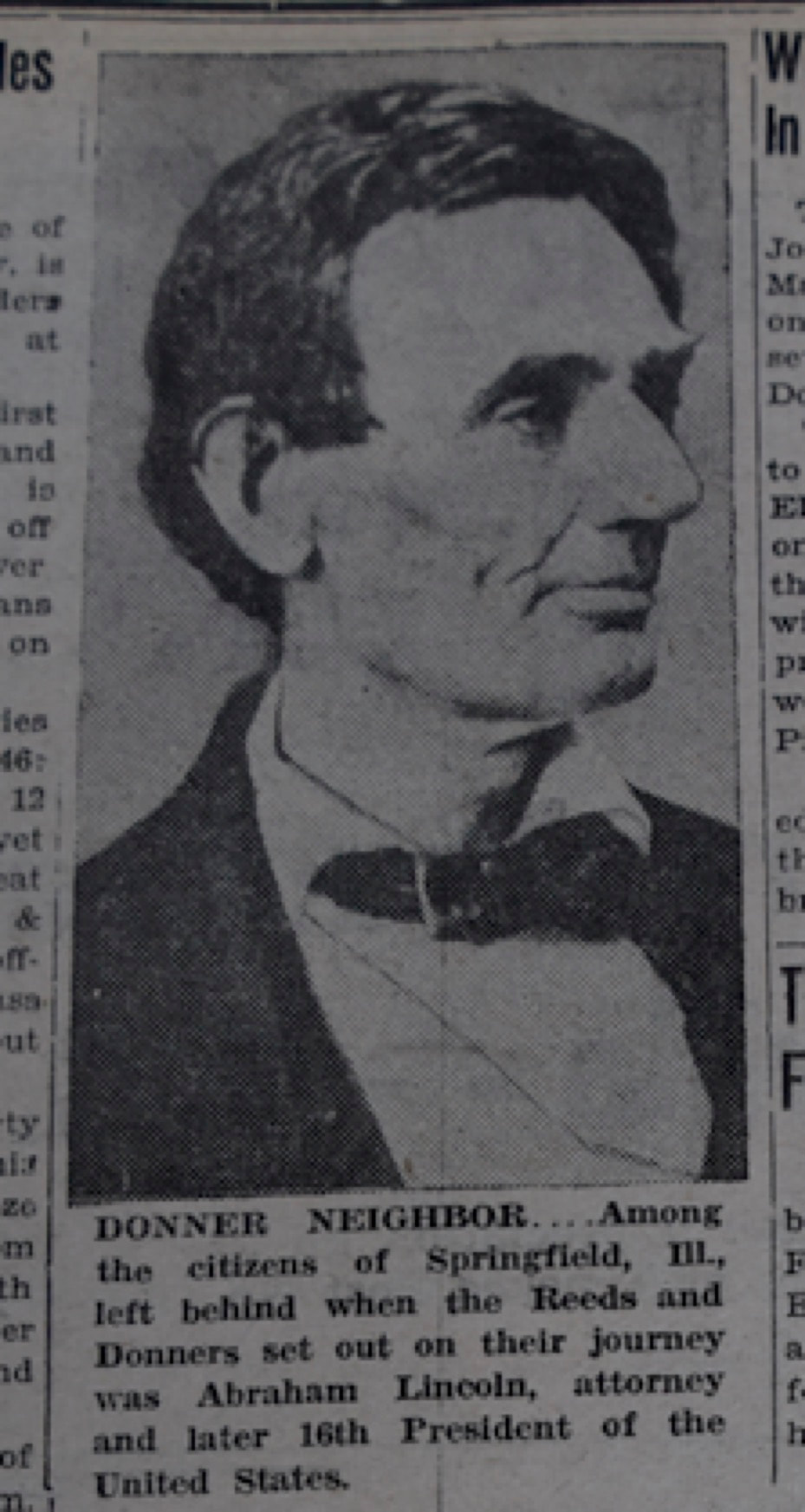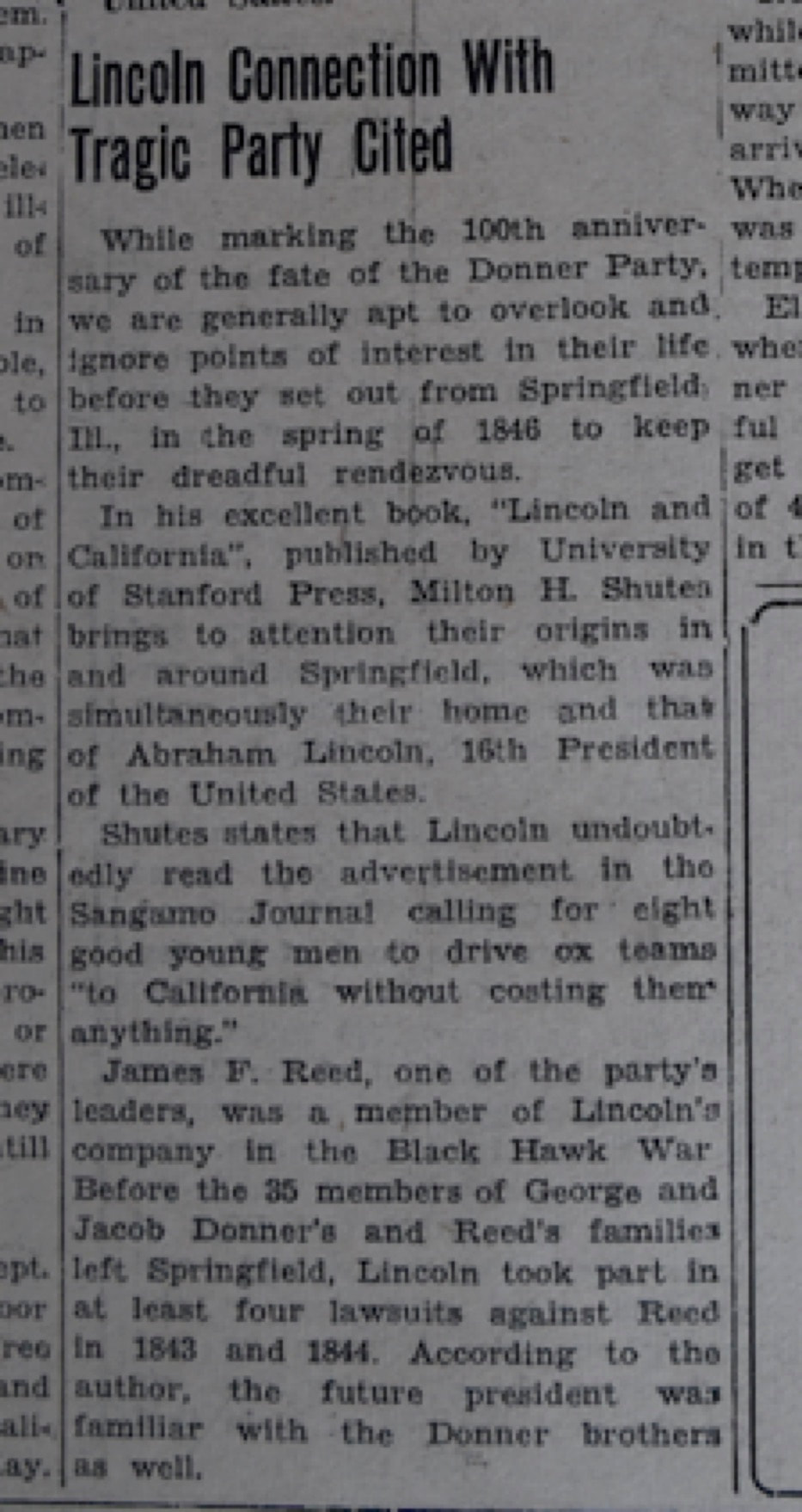What if Lincoln Had Joined the Donner Party?
By Heidi Sproat
One of our Truckee-Donner Historical Society members posed an interesting question. Ever wonder what would/could have happened if … President Lincoln had joined the Donner Party heading westward?
Author Michael Wallis in his excellent 2017 book, The Best Land Under Heaven, posits this very question. Wallis wrote that James Reed “tried his best to convince his friend Abraham Lincoln to pack up his family and join the wagon train.” (p. 44)
President Lincoln signed the Pacific Railway Act on July 1, 1862 which provided Federal subsidies in both land and loans for the construction of a transcontinental railroad across the United States. We all know that Lincoln was the sixteenth President of the United States until his assassination in 1865. But what if we looked a little closer at his earlier years in the 1840s in Illinois and his connections to both the Reeds and Donners of the infamous Donner Party.
In 1832, Abraham Lincoln, then a storekeeper, and James Reed served together in a short-lived conflict known as the Black Hawk war. After that fight ended, Lincoln and Reed continued their relationship, both of them eventually living at the same time in Sangamon County, Illinois. Reed was an energetic entrepreneur who explored all sorts of business pursuits, eventually amassing a good deal of wealth.
In the late 1830s there was considerable talk about building a railroad in Illinois. Then a fledgling politician in the Illinois legislature, Lincoln was part of the group who passed the Internal Improvements Act which was designed to fund and construct a network of area train lines. Guess who got the contract to build part of this train network? James Reed. Reed even had a town named after him, Jamestown, “Jimtown”.
Unfortunately, due to a confluence of circumstances, including the national economic Panic of 1837, the intended railroad spur was much delayed, inadequate, and inefficient for moving goods from farms to markets. The local railroad spur was a bust. Reed met personal financial disaster, and sought out his old soldier mate, Abraham Lincoln, who was by then well known as an up and coming lawyer, for legal help. Lincoln provided much counsel to the debt-ridden Reed.
In the early 1840s, and facing financial ruin, Reed considered a fresh start and listened to the nation’s calls for westward expansion, then coined as Manifest Destiny. The Reeds met the Donner brothers, who were convinced that a move westward was also in their best financial interests. Most of us know how the rest of this story developed.
In early 1846, poised to go westward, Reed shared his intentions with his now good friend Lincoln. Part conjecture, but probably true, Reed must have tried to convince Lincoln to join the wagon train headed for California. However, married at this point to Mary Todd, with young children in tow, Lincoln may have decided not to join them in part because of the objections of his wife, and he must also have given serious thought to the consequences of moving westward – clearly out of the public eye. Assuredly, he must also have considered that such a move would probably end his political ambitions. As it was, recall he served a single term in Congress in August 1846.
As James Reed’s friend, and the Reeds knowing the Donner families, Lincoln presumably would have followed their progress cross country. He must have been devastated to learn of the tragedy of the Donner Party wagon train – and still no way to travel across the ever expansive country.
Lincoln had already been involved with early Illinois train development. Possibly because of his friendship with James Reed, and cognizant of the Donner Party’s deaths and unbelievable hardships they endured, and then signing the 1862 Railway Act, we might expect that Lincoln may have felt a certain obligation to get the Transcontinental Railroad built. He believed this railroad would unite coast to coast. Lincoln sought to draw a nation together by travel, trade, and providing land for the ever-increasing influx of immigrants pouring into the United States.
In July 2010, researchers at the Abraham Lincoln Presidential Library and Museum discovered that James Reed carried four muster rolls from the Black Hawk War in a “carpetbag” on his Donner Party migration to California that had Private Abraham Lincoln’s name on them, including one with Lincoln’s signature.
Author Michael Wallis in his excellent 2017 book, The Best Land Under Heaven, posits this very question. Wallis wrote that James Reed “tried his best to convince his friend Abraham Lincoln to pack up his family and join the wagon train.” (p. 44)
President Lincoln signed the Pacific Railway Act on July 1, 1862 which provided Federal subsidies in both land and loans for the construction of a transcontinental railroad across the United States. We all know that Lincoln was the sixteenth President of the United States until his assassination in 1865. But what if we looked a little closer at his earlier years in the 1840s in Illinois and his connections to both the Reeds and Donners of the infamous Donner Party.
In 1832, Abraham Lincoln, then a storekeeper, and James Reed served together in a short-lived conflict known as the Black Hawk war. After that fight ended, Lincoln and Reed continued their relationship, both of them eventually living at the same time in Sangamon County, Illinois. Reed was an energetic entrepreneur who explored all sorts of business pursuits, eventually amassing a good deal of wealth.
In the late 1830s there was considerable talk about building a railroad in Illinois. Then a fledgling politician in the Illinois legislature, Lincoln was part of the group who passed the Internal Improvements Act which was designed to fund and construct a network of area train lines. Guess who got the contract to build part of this train network? James Reed. Reed even had a town named after him, Jamestown, “Jimtown”.
Unfortunately, due to a confluence of circumstances, including the national economic Panic of 1837, the intended railroad spur was much delayed, inadequate, and inefficient for moving goods from farms to markets. The local railroad spur was a bust. Reed met personal financial disaster, and sought out his old soldier mate, Abraham Lincoln, who was by then well known as an up and coming lawyer, for legal help. Lincoln provided much counsel to the debt-ridden Reed.
In the early 1840s, and facing financial ruin, Reed considered a fresh start and listened to the nation’s calls for westward expansion, then coined as Manifest Destiny. The Reeds met the Donner brothers, who were convinced that a move westward was also in their best financial interests. Most of us know how the rest of this story developed.
In early 1846, poised to go westward, Reed shared his intentions with his now good friend Lincoln. Part conjecture, but probably true, Reed must have tried to convince Lincoln to join the wagon train headed for California. However, married at this point to Mary Todd, with young children in tow, Lincoln may have decided not to join them in part because of the objections of his wife, and he must also have given serious thought to the consequences of moving westward – clearly out of the public eye. Assuredly, he must also have considered that such a move would probably end his political ambitions. As it was, recall he served a single term in Congress in August 1846.
As James Reed’s friend, and the Reeds knowing the Donner families, Lincoln presumably would have followed their progress cross country. He must have been devastated to learn of the tragedy of the Donner Party wagon train – and still no way to travel across the ever expansive country.
Lincoln had already been involved with early Illinois train development. Possibly because of his friendship with James Reed, and cognizant of the Donner Party’s deaths and unbelievable hardships they endured, and then signing the 1862 Railway Act, we might expect that Lincoln may have felt a certain obligation to get the Transcontinental Railroad built. He believed this railroad would unite coast to coast. Lincoln sought to draw a nation together by travel, trade, and providing land for the ever-increasing influx of immigrants pouring into the United States.
In July 2010, researchers at the Abraham Lincoln Presidential Library and Museum discovered that James Reed carried four muster rolls from the Black Hawk War in a “carpetbag” on his Donner Party migration to California that had Private Abraham Lincoln’s name on them, including one with Lincoln’s signature.
Even though Lincoln’s friend James Reed survived the westward journey, maybe Reed’s earlier invitations for Lincoln to join the Reeds and Donners might have been a catalyst for Lincoln’s continued push for the Transcontinental Railroad that the principled Lincoln could not abandon. Or maybe Lincoln posed the “what ifs” had he joined the Reed-Donner party. Where would he have wound up and what political ambitions would he have sacrificed. Just a thought.
References
Wallis, Michael. The Best Land Under Heaven. Liveright Publishing Corporation, New York 2017.
https://community.utah.gov/abraham-lincoln-and-the-transcontinental-railroad/#:~:text=On%20July%201%2C%201862%2C%20one,railroad%20to%20the%20Pacific%20Ocean
https://www.archives.gov/milestone-documents/pacific-railway-act
https://www.ilsos.gov/departments/archives/online_exhibits/100_documents/1837-int-improve-act.html#:~:text=The%20Internal%20Improvement%20plans%20were,to%20the%20state's%20transportation%20network = https://rb.gy/1ksil
https://archive.nytimes.com/www.nytimes.com/books/first/a/ambrose-nothing.html
https://www.cnn.com/2010/US/07/20/california.lincoln.document/
http://www.cnn.com/2010/US/07/20/california.lincoln.document/ , James Frazier Reed Collection at the California State Library.
https://www.seeker.com/abe-lincoln-doc-survived-donner-party-ordeal-1765079259.html
Sierra Sun, 1946, September, Donner Centennial article
References
Wallis, Michael. The Best Land Under Heaven. Liveright Publishing Corporation, New York 2017.
https://community.utah.gov/abraham-lincoln-and-the-transcontinental-railroad/#:~:text=On%20July%201%2C%201862%2C%20one,railroad%20to%20the%20Pacific%20Ocean
https://www.archives.gov/milestone-documents/pacific-railway-act
https://www.ilsos.gov/departments/archives/online_exhibits/100_documents/1837-int-improve-act.html#:~:text=The%20Internal%20Improvement%20plans%20were,to%20the%20state's%20transportation%20network = https://rb.gy/1ksil
https://archive.nytimes.com/www.nytimes.com/books/first/a/ambrose-nothing.html
https://www.cnn.com/2010/US/07/20/california.lincoln.document/
http://www.cnn.com/2010/US/07/20/california.lincoln.document/ , James Frazier Reed Collection at the California State Library.
https://www.seeker.com/abe-lincoln-doc-survived-donner-party-ordeal-1765079259.html
Sierra Sun, 1946, September, Donner Centennial article
Note 8/20/2023: By happenstance, the author caught this earlier NPR recording about this very issue, and author historian Michael Wallis' thoughts on the possibility of Lincoln joining the Donner-Reed party. https://www.npr.org/transcripts/534557072 .



